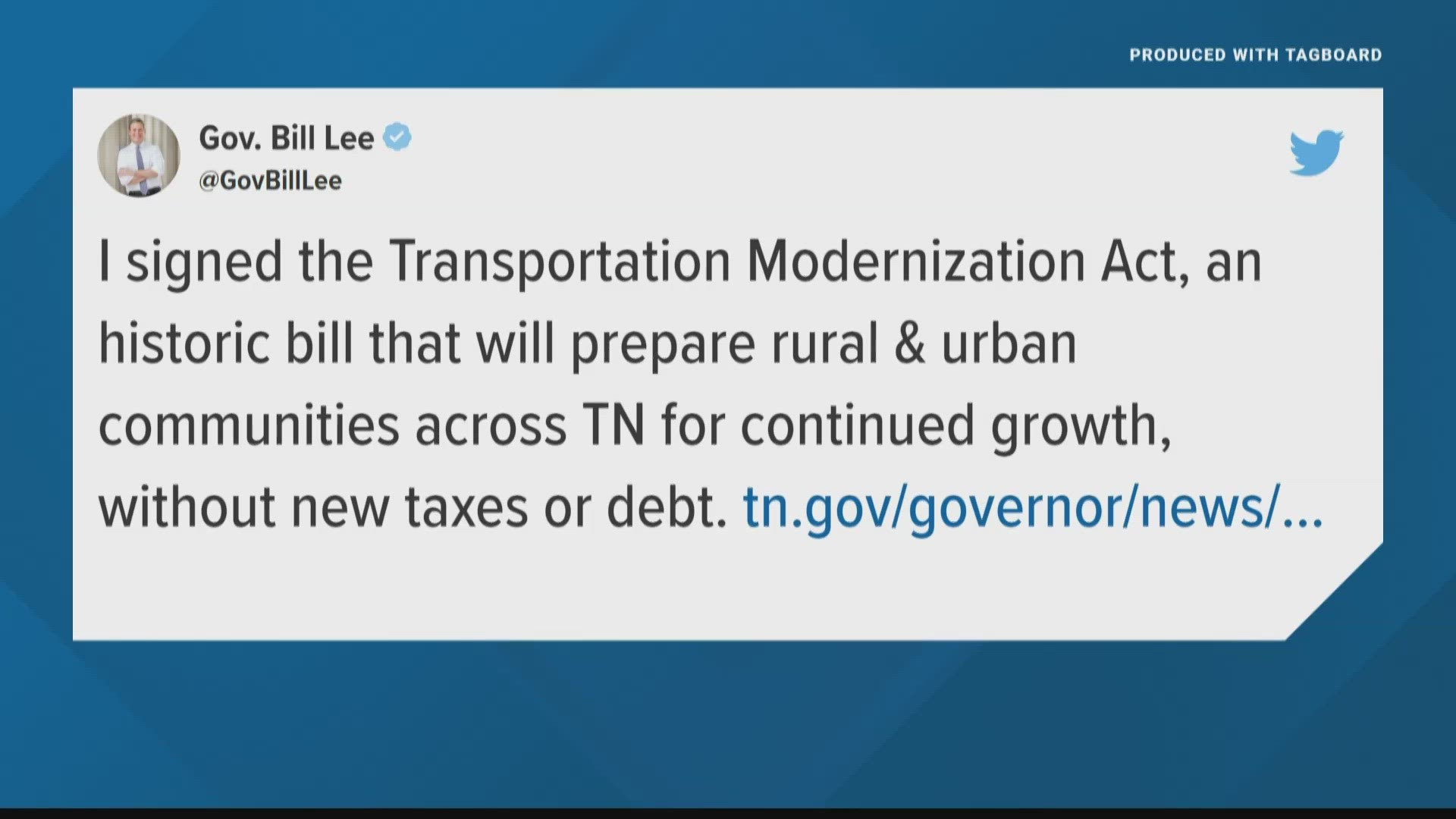NASHVILLE, Tenn. — Update (4/17/23)
Governor Bill Lee signed the Transportation Modernization Act into law on Monday, according to a release from his office.
It will create a new strategy and invest $3.3 billion to accommodate Tennessee’s record growth, address traffic congestion and meet transportation needs across rural and urban communities, according to the release.
“As families and businesses move to Tennessee in record numbers, we need a transportation plan to keep up with the pace,” Lee said. “Our strategy will meet our state’s transportation needs across rural and urban communities, without new taxes or debt. I commend the General Assembly for its partnership to prepare Tennessee for continued growth and economic opportunity.”
Lee's office said the plan will give the Tennessee Department of Transportation (TDOT) the resources needed to solve the state’s current and future mobility challenges, including seeking the use of public-private partnerships to preserve state funds for rural infrastructure priorities, exploring Choice Lanes to decrease congestion and increase economic impact statewide, and expanding the alternative delivery model to save taxpayer dollars and deliver road projects more efficiently.
“Tennessee is facing a critical juncture when it comes to mobility, and our new transportation strategy will prepare TDOT to build and maintain roads across rural and urban communities,” TDOT Commissioner Butch Eley said. “I appreciate the work of the legislature and key partners to ensure continued prosperity throughout Tennessee.”
The bill was sponsored by Senate Majority Leader Jack Johnson (R - Franklin), Senate Transportation & Safety Chair Becky Massey (R - Knoxville), House Majority Leader William Lamberth (R - Portland) and House Transportation Chair Dan Howell (R - Cleveland), according to the release.
Original Story
A bill that would allow the Tennessee Department of Transportation to collect "user fees" on some roads across the state passed the Tennessee legislature on Thursday, according to a press release from TDOT. It passed the Senate on March 20 and the House on March 30, and is headed to the governor's desk.
The bill, SB 0273, is also known as the "Transportation Modernization Act." Senator Jack Johnson (R - Franklin) introduced it and shared many of the same proposals TDOT and Governor Bill Lee spoke about when they discussed ways to address issues with the state's roads.
The bill allocates $3.3 billion to accommodate the state's growth address traffic congestion and meet transportation needs across rural and urban communities.
TDOT previously proposed its "Build With Us" plan, which involves using "Public-Private Partnerships" to address growing congestion concerns. In that proposal, they said the congestion on state roads, longer times to complete projects and fewer workers in its ranks were three major challenges facing the state in coming years.
They previously said they would need an additional $26 billion in funding to address the issues and keep pace with the state's growth. Some of that money could be made up by working with private companies to build roads, they said in the plan.
In December, Gov. Lee also said he was considering allowing express toll lanes on highways to help fund the department. He also said he was considering whether to triple the fee for electric car owners.
The bill says that the General Assembly intends to generate funds for the department by "authorizing user fees as an additional and alternative method for funding or financing the development and operations of highways and appurtenant facilities or other transportation-related facilities."
It requires TDOT projects that involve user fees to "be in accordance with the department's long-range statewide transportation plan." It also requires TDOT to specifically identify proposed user fee projects in the transportation improvement program given to the General Assembly.
Road projects would also need to be submitted to a new Transportation Modernization Board for approval, and development on the project could not be continued until it is approved. The board would be made up of five members.
TDOT would also need to consider the economic, social and environmental effects of the projects. They would need to get an environmental evaluation that includes public comments, including comments from a metropolitan planning organization or rural planning organization, before developing the final construction plans.
The bill also specifically says that user-fee facility projects would be subject to public hearings, and TDOT would need to hold these hearings during the environmental evaluation of the project.
The bill says emergency vehicles would not need to pay the user fee if they are responding to an emergency or displaying a flashing light, and neither would cars operated by a public transit authority, such as buses.
The bill says anyone who uses a user-fee facility and does not pay the fee within 90 days would face a Class-C misdemeanor and could be fined up to $50. If someone does not pay the fee three times of more, the bill says their vehicle registration could be suspended.

